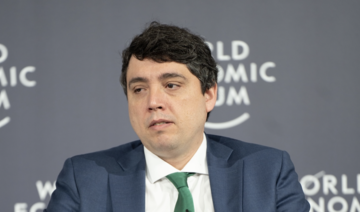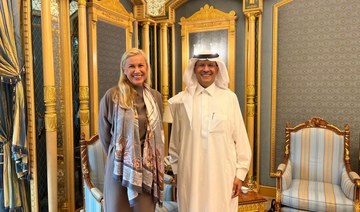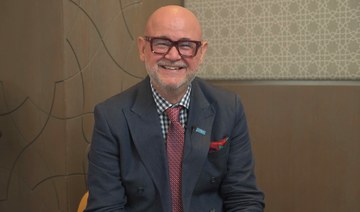SEOUL: Less than a week after Huawei Technologies was blacklisted by the United States, more than a hundred South Korean politicians and business leaders toured the Chinese tech giant’s headquarters and its lavish new campus outside Shenzhen.
Executives from firms such as Samsung Electronics watched demonstrations of high-speed robotics and smart city simulations powered by Huawei’s next-generation 5G network equipment. The event was part of a Seoul-backed forum aimed at building tighter tech links between China and Asia’s fourth-largest economy.
But the gathering was overshadowed by the US decision early this month to ban American tech and telecom firms from doing business with Huawei, and a push to get companies around the world to follow suit.
The campaign against Huawei, and the broader US-China trade war, have landed export-driven South Korea in a familiar bind, caught between its crucial security ally and biggest trading partner.
Key global tech companies are suspending sales of parts and software to the Chinese firm and several mobile carriers are delaying the launch of new Huawei handsets. But in South Korea, business executives and politicians said they see few alternatives to conducting business with China as normal.
For Samsung, South Korea’s national tech champion, any advantages it could gain from Washington’s move against Huawei would be outweighed by the pain of lost business, experts said.
Samsung could increase share at Huawei’s expense in smartphones and telecom network equipment, and its stock has ticked up modestly since the US ban was announced. The broader trade war could also blunt the rise of new Chinese rivals in chips and smartphone screens.
But Huawei is also one the biggest customers for Samsung’s memory chips, and the South Korean firm has multiple factories in China serving a plethora of customers. Samsung Vice Chairman Yoon Boo-keun was among those who took part in the Huawei tour.
“They compete, but they are important partners too,” said Min Byung-doo, a South Korean ruling Democratic Party member of parliament who was part of the tour, referring to Huawei and Samsung. He told Reuters that South Korean companies had “no simple alternative” to maintaining business relationships with Huawei.
Samsung declined to comment.
’Moment of truth’
South Korean government officials and tech company executives say there is plenty to worry about in the long run.
China is South Korea’s largest trading partner, accounting for 26.8% of the country’s exports in 2018, compared with 12% for the United States.
Huawei alone bought $10.7 billion worth of South Korean products last year, accounting for about 17% of the country’s electronics parts exports to China, according to data from the South Korean government and Huawei.
South Korea’s SK Hynix, the world’s No.2 memory chip maker, counts Huawei as its top customer.
Some experts believe South Korea will not be able to walk the line between the two powers amid an intensifying tech trade war.
“South Korea has to face the moment of truth — choosing the United States or China,” said Han Suk-hee, a professor of Chinese studies at Yonsei University and a former South Korean consul general in Shanghai.
“What if the US is not only asking not to use Huawei products but also not to export South Korean semiconductors to China? The government needs to prepare for that worst-case scenario.”
Washington has warned allies that adopting Huawei technology in 5G networks could lead the US to curtail intelligence sharing.
South Korea’s presidential office said it cannot comment on discussions with Washington.
A South Korean government source close to the situation said there are no easy answers.
“Sorry, we are not the United States, and can’t just do the same as what the US is doing to China,” he said when asked whether the country will join the US campaign against Huawei. “We can’t jump to a simple conclusion.”
LG Uplus Corp, the only South Korean telecom firm to use Huawei equipment for its 5G network, declined to comment.
For its part, Huawei said it plans to open a 5G lab in South Korea on Thursday as a sign of its commitment to partnership.
“Huawei has an ‘In Korea, for Korea’s advancement’ philosophy,” Huawei’s head of Asia-Pacific, Tian Feng, was quoted as saying by South Korean officials who took part in the tour.
China’s clout
Memories are still fresh in South Korea of how damaging retaliation by Beijing can be.
Angry over Seoul’s decision to deploy a US THAAD anti-missile defense system in 2016 to counter North Korea, China informally banned group tours to South Korea and suspended construction projects by retail giant Lotte.
Samsung’s smart phone market share in China halved in 2017 from a year earlier, according to Strategy Analytics. Hyundai Motor’s sales plummeted by one-third as a result of the missile dispute.
At some South Korean companies, officials grumble that their government is powerless to counter China and has not done enough in the face of what they see as unfair subsidies and other trade practices.
“We feel as if we are left alone to fight to survive, not being able to get any government support when the Chinese government is all out there to advance their high-tech industries,” an official at a major South Korean display maker said, asking for anonymity due to the sensitivity of the matter.
“Our government was in disarray without any pre-emptive plans in the THAAD situation, while our companies kept bleeding in China,” said the chief executive of a South Korean firm that supplies parts for Huawei smartphones, who also declined to be named.
“This time around, I hope our government can provide a clear vision and protect our companies.”
Huawei ban puts South Korea in a familiar place — caught between the US and China
Huawei ban puts South Korea in a familiar place — caught between the US and China
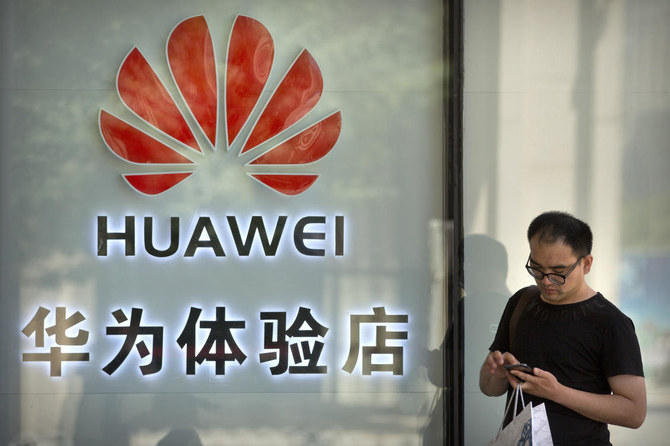
- The campaign against Huawei, and the broader US-China trade war, have landed export-driven South Korea in a familiar bind
- Huawei alone bought $10.7 billion worth of South Korean products last year
Saudi chemicals giant SABIC targeting net zero by 2050, CEO says
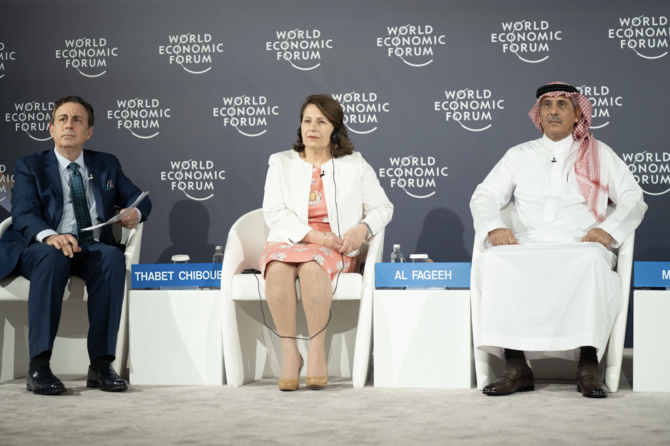
- SABIC aims to convert 1 million tons of waste into feedstock for the petrochemical industry by 2030, Al-Fageeh said
RIYADH: Saudi Arabia’s top chemicals company is turning to circular economy solutions to reach carbon neutrality by 2050 and advance the Kingdom’s net-zero agenda, its CEO has said.
Abdulrahman Al-Fageeh, CEO of the Saudi Basic Industries Corporation, was speaking at the “Demand for Energy ... Transforming Costs into Gains” panel during the special meeting of the World Economic Forum in Riyadh.
SABIC aims to convert 1 million tons of waste into feedstock for the petrochemical industry by 2030, he said.
The circular carbon economy has helped the chemicals sector expand its investment horizon since 2020, he added.
Al-Fageeh said that SABIC marked achievements in energy efficiency and reduced its carbon footprint at the end of 2023 by 12.74 percent. The company is targeting carbon neutrality by 2050.
SABIC has also adopted alternative energy from plastic waste, seeking to produce 1 million tons of sustainably sourced chemicals by 2030.
Energy efficiency
Al-Fageeh said that his company had started sustainability programs at an early stage, improved reliability, developed 90 initiatives and projects, and closed a number of sites due to ineffectiveness.
In 2023, SABIC had more than 200 patents, 40 percent of which related to sustainability in energy efficiency.
Concierge robots set to become reality in the hospitality sector
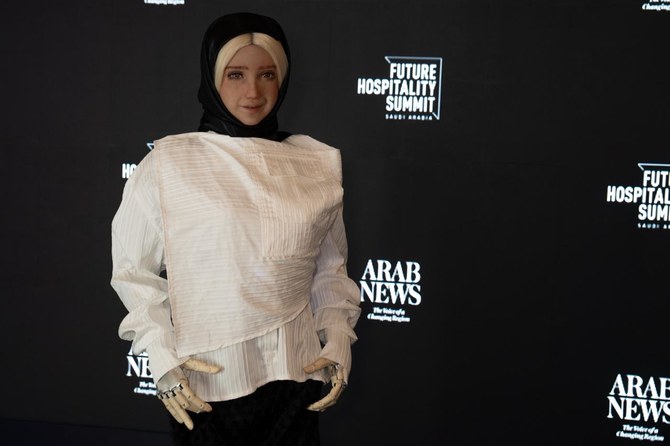
RIYADH: A personal robot concierge is set to become a reality as a new wave of technological innovation takes the spotlight during the Future Hospitality Summit in Riyadh.
In an interview with Arab News during the event, Janet Adams, chief operating officer of global artificial intelligence company SingularityNET, shared details about a new humanoid robot expected to revolutionize the hospitality sector.
“One of our projects which we are pioneering right now is the development of a new class of humanoid robots specifically designed for the service industries,” Adam told Arab News.
“Imagine going to stay in a hotel where you’ve connected with your robot before you go there. They know everything you want. They can greet you at the door because you’ve been chatting as an avatar,” she said.
“And then after you leave, they can stay in touch with you and they can be like a loyalty ambassador, robotic avatar, friend for life who understands your needs, who understands what you enjoy, who makes everything perfect for you in your stay in the hospitality industry,” Adams added.

She further explained that the development, known as the Mind Children project, will roll out its pilot in early 2025.
Furthermore, Adams shared that the company is working on a new breed of technological advancement for AI in language models in the Middle East.
The company is working with Zarqa, a Middle Eastern AI firm part of SingularityNET’s ecosystem, to significantly improve AI language models.
“What we’re doing is we’re taking the best of today’s large language model technology, and we’re infusing it with the best of tomorrow’s artificial general intelligence technology, because we’re leaders in the field of artificial general intelligence,” Adams explained.
“And sometime within the next 12 to 24 months, we expect to see enormous breakthroughs where the limitations of today’s language models are overcome, where we can bring human level reasoning or human style reasoning into our robots and therefore give them the capability to be creative, to understand their environment, to really, truly contribute as a, for example, to hospitality services,” she added.
During the event, SingularityNET also showcased Desdemona, a humanoid robot and the lead vocalist of the Jam Galaxy Band.
“She runs up a huge array of advanced artificial intelligence models. She’s working with vision, with speech processing. We work with toxicity filters. We work with emotion recognition, facial recognition. We have a variety of AI models, including Markov decision-making and generative adversarial networks,” she explained.
“And a bunch of the most advanced AI that’s available on the planet. Together. All work together in this, in what looks like a seamless operation of multiple modules working together. She’s truly a highly advanced miracle of modern AI,” Adams added.
Brazilian energy official from Riyadh: ‘We are on our way to join OPEC+’
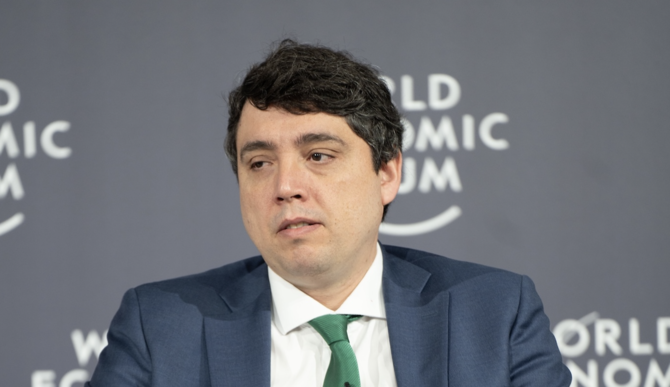
- Mendes stressed the importance of South-South cooperation, noting his country’s relationship with Egypt and Saudi Arabia
RIYADH: Pietro Mendes, Secretary of Oil, Gas and Biofuels at Brazil’s Ministry of Mines and Energy, confirmed on Monday that his country is on its way to joining the OPEC+ alliance.
Mendes’ announcement came during his participation in a session titled “Energy Demand: Transforming Costs into Profits” during the special meeting of the World Economic Forum held in Riyadh.
Brazil ranks ninth in the world in oil production at 3.25 million barrels per day.
“Brazil is joining OPEC+. So, the idea is to create cooperation because there (are) differences between regions and we don’t have just one single solution that comes from us or a union; we need to recognize all the solutions,” the Brazilian official said, adding while his country continues to produce oil and gas, it is simultaneously increasing reliance on renewable energies and adopting solutions to reduce emissions.
Mendes stressed the importance of South-South cooperation, noting his country’s relationship with Egypt and Saudi Arabia, where several initiatives are being developed for cooperation in biofuels and technology, including artificial intelligence, is being adopted to reduce carbon emissions.
‘Headquarters of your life’ coming to Saudi Arabia, says Wyndham Hotels regional president
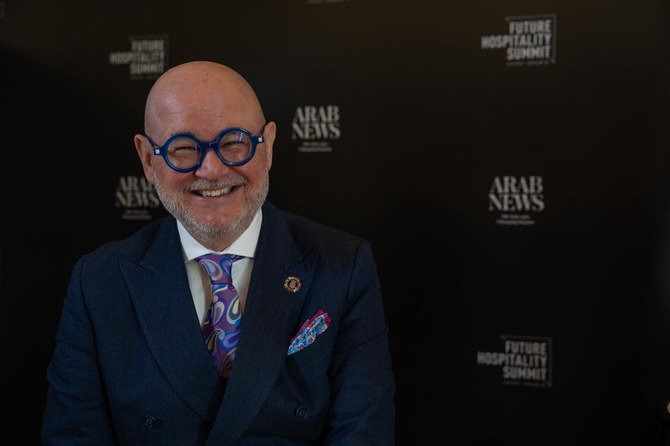
RIYADH: HQ, the new hospitality brand launched by Wyndham Hotels & Resorts and renowned hotelier Sam Nazarian, is set to arrive in Saudi Arabia by the end of 2025, Arab News has been told.
Dimitris Manikis, president of Europe, the Middle East, Eurasia and Africa, at the hospitality group, unveiled the company’s ambitious plans for the Kingdom – including the launch of HQ – at the Future Hospitality Summit in Riyadh.
Speaking to Arab News, Manikis shared insights into Wyndham’s steadfast commitment to Saudi Arabia’s flourishing hospitality landscape, saying: “We are very serious and very bullish about our presence in the Kingdom.”
He added: “We’re really excited to bring this new brand into Saudi Arabia as well, because it’s about smart luxury. It’s about F&B (food and beverage), entertainment, music, and it’s about smart hospitality as well.”
Manikis went on to say: “In the next 18 months, you’re going to have the first HQ brand in Saudi Arabia.”
Citing Nazarian’s track record of success with brands like Mondrian, Delano, and SLS, Manikis said: “Sam is notoriously famous for bringing up new concepts and ideas. So when I asked him: ‘What exactly is HQ and why would you call it brand HQ?’, he said: ‘I want the brand to be the headquarters of your life.’”
The President added: “I have no doubt whatsoever that HQ will be an amazing brand to grow in the GCC (Gulf Cooperation Council), and the Kingdom of Saudi Arabia in particular.”
Manikis reflected on Wyndham's impressive footprint across the Kingdom, which includes a robust pipeline of 20 upcoming projects. Notable among these ventures are the imminent openings of the Ramada hotels.
Additionally, the introduction of Wyndham Garden last year marked a significant milestone in the company’s strategic expansion efforts.
The optimism surrounding Saudi Arabia’s tourism prospects was palpable in Manikis’ remarks, citing the Kingdom’s remarkable achievement of surpassing the Vision 2030 tourism target of 100 million visitors in 2023.
“The bar has gone to 150 million tourists,” he remarked, highlighting Saudi Arabia’s accelerated progress towards becoming a global tourism destination.
However, he cautioned against neglecting the crucial role of infrastructure development in sustaining this growth momentum.
“Infrastructure, planes, airports, railways, roads, highways,” Manikis said, stressing the necessity of robust infrastructure to accommodate the influx of tourists.
Commending the government’s proactive measures, including the launch of a new airline and airport expansions, he expressed confidence in Saudi Arabia’s readiness to meet escalating demand.
“I do believe that the Kingdom of Saudi Arabia is actually going to fulfill the promise. And they're going to have an amazing Expo (2030). I don't think there's going to be any doubt about that,” he said.
As anticipation mounts for marquee events like the Expo and the FIFA World Cup in 2034, Manikis underscored the importance of post-event planning.
“It's not just about the event, it’s about what you do after,” he cautioned, advocating for sustainable strategies to leverage event infrastructure effectively beyond the festivities.
In addition to the HQ brand, Wyndham is poised to capitalize on the burgeoning extended stay segment.
“We are very bullish on extended stay,” Manikis stated, recognizing its potential to cater to diverse clientele, including families, business travelers, and digital nomads.
He added: “We added 11 beautiful luxury, extended stay products. And hopefully we’re going to extend the extended stay concept here in the Kingdom as well.”
IsDB, SFD, Arab Coordination Group join hands to raise $500m for education initiatives
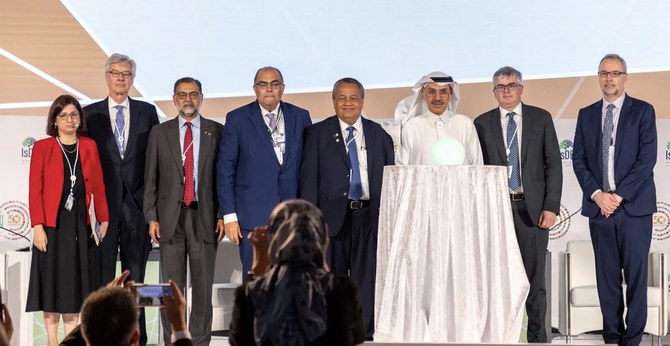
RIYADH: A global partnership involving the Islamic Development Bank will inject $500 million into educational initiatives across member countries of the Organization of the Islamic Cooperation.
During the annual meetings and golden jubilee celebrations of the IsDB, the Arab Coordination Group and the Saudi Fund for Development also joined The Global Partnership for Education, the Saudi Press Agency reported.
The Global Partnership for Education is a multi-stakeholder partnership and funding platform that aims to strengthen education systems in developing countries.
The amount will be raised by the Smart Finance for Education Initiative, an innovative financing tool.
Moreover, partners also pledged an additional $350 million to the initiative, including $150 million from the IsDB, $100 million from the Arab Bank for Economic Development in Africa, and $50 million from The Islamic Solidarity Fund for Development as well as $50 million from the Global Partnership for Education.
The initiative aims to enhance access to quality education in 37 OIC member countries, where 28 million children are without schooling.
Also at the event, the Islamic Corporation for the Insurance of Investment and Export Credit, a member of the IsDB concerned with providing Shariah-compliant insurance services, signed a retakaful agreement for a percentage of the shares allocated to Indonesia for the benefit of the country’s Eximbank.
A retakaful agreement is an Islamic reinsurance contract where takaful operators transfer a portion of their risk to a retakaful operator in compliance with Shariah principles.
The arrangement aims to provide strategic expertise and capabilities in the field of retakaful through a quota-sharing treaty specifically designed to support the launch of the financial institution’s new export credit takaful program product.
This comes as the business expected to be insured under this treaty is estimated at a value of $13 million during the year 2024.
During the IsDB annual meetings and jubilee celebrations, the bank’s president, Mohammed Sulaiman Al-Jasser, confirmed that the entity has designed a strategy for eco-conscious growth and low carbon reduction by supporting members to reach the zero-carbon goal.
Al-Jasser also pointed out that 40 of the bank’s projects are about renewable energy, green projects, and financing climate action.
He underlined the bank’s focus on green initiatives and sustainable development sukuk, indicating they are compatible with the Capital Markets Union standard.
The IsDB’s 2024 annual meetings are being held under the patronage of King Salman bin Abdulaziz in Riyadh from April 27 - 30.
The annual sessions coincide with IsDB’s golden jubilee, as the institution celebrates 50 years of promoting economic and social development in 57 member nations under the slogan “Taking pride in our past, shaping our future: authenticity, solidarity, and prosperity" reflecting the bank’s legacy and future goals.





